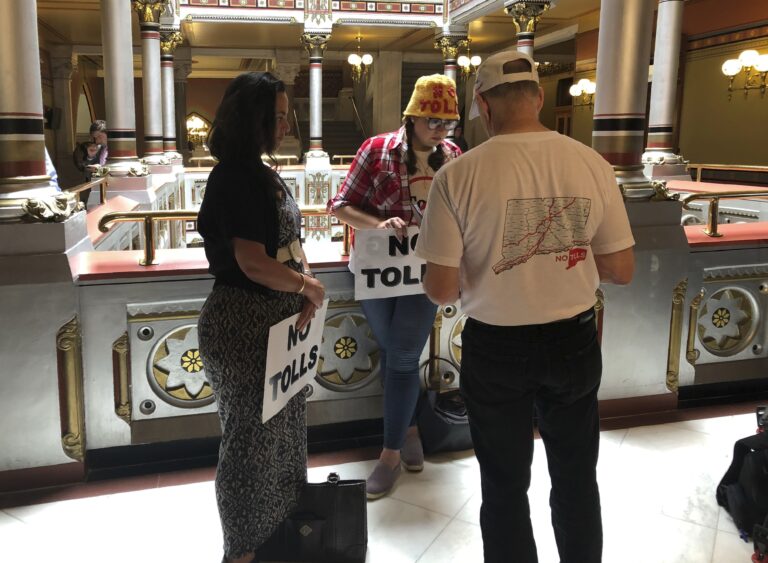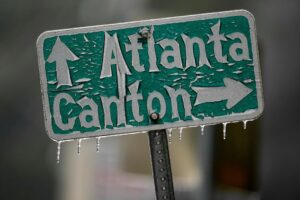HARTFORD, Conn. — Gov. Ned Lamont acknowledged Wednesday there is a divide between his administration and Connecticut legislators over the need for electronic tolls to generate more state transportation revenue but vowed not to give up on the issue.
While the Democratic-controlled General Assembly adjourned on June 5 without approving a tolling bill, the Democratic governor and former businessman has held out hope that legislation authorizing tolls will finally be passed during a special legislative session. But it remains unclear whether that will happen.
“I would say there was quite a divide in terms of what we do, and I’m not sure that we’ve found a toll bridge to connect us,” Lamont said, following a two-hour closed-door meeting he organized with Democratic and Republican legislative leaders. “But I’m going to try my best. I’ve been doing deals for a long time.”
Lamont and some of his top advisers provided a presentation to the lawmakers about Connecticut’s transportation funding needs, warning that the state faces the possibility of being penalized by the federal government in about 10 years for not keeping enough of its roads and bridges in good repair. The state is on track to spend about $875 million annually on transportation infrastructure, but Lamont’s administration estimates the need is actually about $1.2 billion a year.
The net revenue from tolls has been estimated to be about $800 million annually.
The issue of tolls is a politically contentious one. About a dozen citizens who oppose tolls, many holding signs, showed up at the state Capitol on Wednesday and shouted “no tolls” as Lamont, the legislators and others walked into the meeting. While they credit their lobbying efforts with helping to scuttle a vote during the regular legislative session, the toll opponents plan to keep up the fight.
“It’s a trust issue with me. I’m not going to take it for granted that they’re not going to do anything this time,” said Kevin Kupstis, an informational technology industry worker from Southington, who held signs that read “No Tolls! Cut Spending!” and “Tolls = Tax On Working Poor.”
To help make tolls more affordable and possibly more politically palatable, the package of proposals presented to the lawmakers Wednesday includes a plan for “middle class tax relief” by lowering the state’s lowest personal income tax rate of 3% to 2%.
In Connecticut, the first $10,000 of taxable income for single filers and first $20,000 for joint filers is currently taxed at 3%. Lowering that bottom rate would give all filers a tax break ranging from $90 to $180, according to Lamont’s proposal. There’s also a 20% tolling discount for low-income Connecticut residents; a 30% discount for all Connecticut residents with an EZ-Pass; and a 20% discount for frequent drivers.
The two Republican leaders didn’t appear to know a lot about the income tax proposal, saying Lamont’s presentation ended before the idea was discussed at length. But it didn’t seem to make much of a difference, with both the GOP leaders of the House of Representatives and the Senate reiterating they continue to oppose tolls.
Still upset at not being part of the negotiations on the new two-year state budget, House Minority Leader Themis Klarides of Derby said she believes the Republicans were invited to Wednesday’s meeting because the Democrats don’t have enough support within their own ranks to pass a tolling bill.
“Do I believe they want us in that room to have this conversation? Yes,” Klarides said. “But I believe they want us because they don’t have the votes on their own.”
Despite saying there’s a divide with lawmakers, Lamont contends there is enough support among just the Democratic lawmakers to pass a tolling bill, and he’s working with the Democratic leaders to determine the right time for a vote. Asked if he’s confident there will be a decision on tolls in a special session, Lamont answered he’s “very confident.”
The Associated Press is an independent global news organization dedicated to factual reporting. Founded in 1846, AP today remains the most trusted source of fast, accurate, unbiased news in all formats and the essential provider of the technology and services vital to the news business. The Trucker Media Group is subscriber of The Associated Press has been granted the license to use this content on TheTrucker.com and The Trucker newspaper in accordance with its Content License Agreement with The Associated Press.










